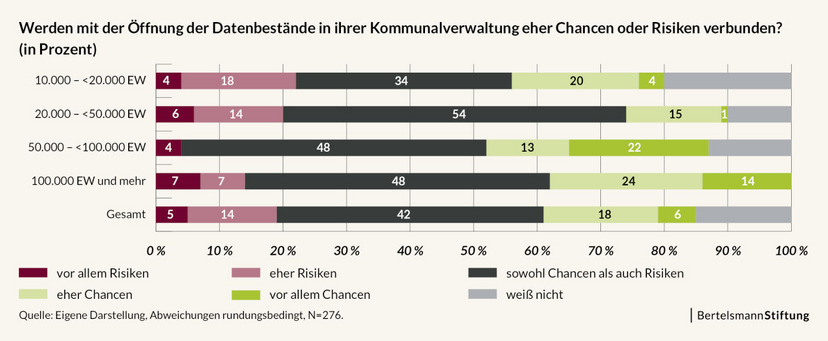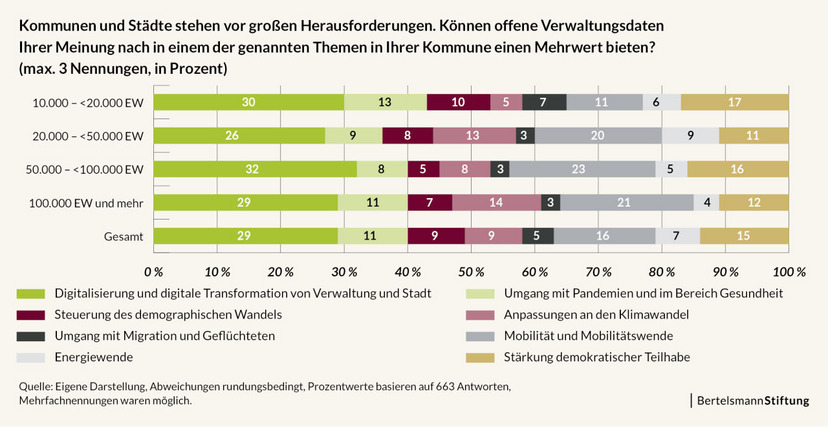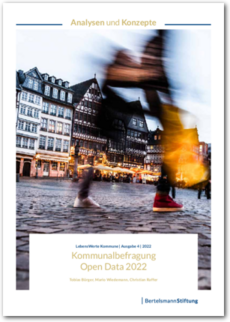The percentage of communities that view open data as advantageous almost doubled compared to the first municipal survey in 2020. While only 14 percent of respondents two years ago said that open data offered benefits for public administrators, 24 percent now say this is the case. The increase is particularly noticeable in cities with over 100,000 inhabitants, where the percentage rose from 15 to 38 percent. In medium-sized cities (50,000 to 100,000 inhabitants), the increase is also very high, from 13 percent in 2020 to 35 percent in 2022. Across all community sizes, the largest group is the one in which respondents say they associate open data with “both opportunities and risks.”
![[Translate to English:] Blick auf einen Marktplatz einer Stadt mit vielen alten Gebäuden. Es sind verschwommene Umrisse im Bild zu sehen von einer Person die gerade vorbeigeht.](/fileadmin/files/_processed_/0/4/csm_iStockphoto_628535110_MPL_ST-K_02_5dec255de7.jpg)
Getty Images/iStockphoto/Leonardo Patrizi
Communities increasingly recognize the opportunities offered by open data
More and more, open data are being viewed by cities and towns as a valuable opportunity. For the second time, the Bertelsmann Stiftung conducted a survey together with Difu, the German institute of urban affairs, examining which specific opportunities and challenges communities in Germany associate with open data. Over 300 cities and towns participated in the survey.
Content
The higher number of cities and towns that now view open data as an opportunity can be traced back to the fact that municipalities increasingly recognize the concrete ways that freely accessible data can add value. The biggest advantage, they feel, is the higher quality of information that is available to the public, followed by the greater ease of exchanging data among government departments within a community. Overall, in 2022 a greater percentage of respondents say that open data provide advantages compared to 2020.
The survey also examined specific challenges that can be overcome with the help of open data. The most mentioned were “Digital transformation of public administration and the community,” followed by “Mobility and the mobility revolution.”
Large gap between cities and towns
At 72 percent, most of cities participating in the survey already make data freely accessible, while only 18 percent of the surveyed towns do so. Not all towns have made an explicit decision not to publish open data, however, since 62 percent say they have not yet addressed the topic. When asked why they have not done so, 89 percent say they are too short-staffed.
There is also a clear difference between cities and towns when it comes to using data for strategies or mission-critical processes. Of the cities surveyed, 30 percent say that they have a data strategy; among towns the figure is only 11 percent. Just 7 percent of cities say that data strategies play no role in their community, while the corresponding figure among towns is 43 percent.
The survey shows that German communities are moving at two different speeds when it comes to implementing open data: Larger cities more often have a strategic orientation and more plentiful resources. Smaller communities are increasingly getting started, but lack the necessary expertise and resources. If these different speeds do not begin to converge, the gap will only continue to grow.
What kind of support would communities like?
Germany’s cities and towns have made progress in the past two years in terms of making data accessible, yet considerable hurdles often exist when it comes to implementing open-data processes in local administrative structures. The survey’s findings show that the country’s communities are doing much more in the area of open data. However, in addition to the need to expand and transfer know-how, the lack of human and financial resources remains a major obstacle, especially for smaller communities.
What kind of support would communities like? When it comes to designing and implementing open data, the surveyed cities and towns say they could use practical tools, such as guides and manuals, along with financial support, greater inter-community cooperation and cross-regional data portals.
The 2022 Municipal Survey on Open Data concludes with four recommendations (described in the study in greater detail) for federal, state and local authorities:
- Create a clear legal basis for publishing open data.
- Support financially challenged and smaller communities in particular.
- Establish open data as an integral part of modern, digital municipal government.
- Promote cooperation between communities and between different stakeholders within each community.
About the study
The 2022 Municipal Survey on Open Data was carried out on behalf of the Bertelsmann Stiftung by Difu, the German institute of urban affairs. During the survey, Difu contacted approximately 1,600 cities and towns in Germany over a five-week period in April and May 2022. A total of 345 communities participated in the survey.
Survey results as open data
Only a selected subset of the complete figures appears in the publication, namely those data that were found to be particularly relevant as the results of the survey were being evaluated. To prevent the data from remaining underused and in light of the Bertelsmann Stiftung’s role as a nonprofit organization, all of the survey’s findings are being made freely accessible. We would thus like to enable other researchers to use the data as they address issues of their own (e.g. for bachelor’s, master’s or doctoral theses, or for other research projects).





![[Translate to English:] Landschaft](/fileadmin/files/_processed_/9/0/csm_AdobeStock_252046738_KONZERN_ST-CC_bearb_Original_96691_abf5b7c75d.jpg)
![[Translate to English:] Ein Landwirt steht in einem Feld und hält ein Tablet in der Hand](/fileadmin/files/_processed_/4/b/csm_AdobeStock_274990218_KONZERN_ST-LK_Original_97477_c1986149e9.jpeg)



